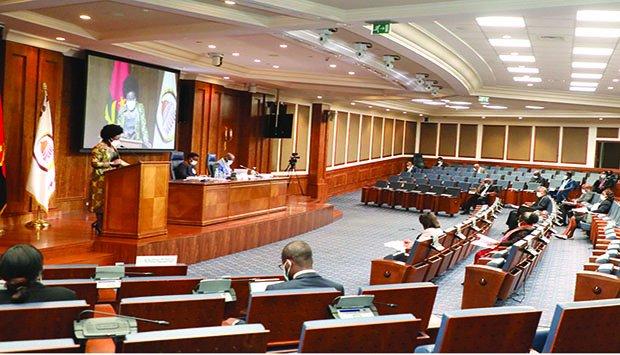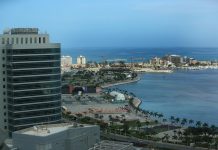Africa-Press – Angola. Customers of insurance companies will be able to see their rights more protected, if the proposed Law on Insurance and Reinsurance Activity is approved, under discussion, in detail, since Monday (07) in the National Assembly.
The measure contained in the diploma confers, among other things, a more effective and intense action by the Angolan Insurance Regulation and Supervision Agency (AR-SEG) and updates the insurance regime to the best international practices.
The chairman of the Board of Directors of ARSEG, Elmer Serrão, highlighted that the instrument under discussion will allow, above all, a sound and prudent management of insurance companies.
The proposed law, he said, represents a major step forward for clients in terms of the powers conferred on the supervisory body of insurance activity. It will ultimately allow for a more direct and quick action in order to repress infractions that harm customers.
For Elmer Serrão, one of the fundamental objectives of the proposal is to provide modern supervisory mechanisms that improve the work of ARSEG and a whole set of requirements for insurance companies to adapt and carry out, with greater security, activities with policyholders of these services. , with emphasis on the sale of direct insurance and, in some cases, reinsurance.
The instrument, he added, will reinforce ARSEG’s supervisory powers that were concentrated in the Ministry of Finance, now moving to its direct supervision to take certain measures, which were previously the responsibility of the Minister of Finance, with emphasis on sanctions and even those related to to the registration and authorization of incorporation of insurance companies.
The diploma, he reinforced, also includes an infraction chapter that may be applicable in cases of wrong insurance conduct, adding that there is a need to safeguard the prevention and repression of those conducts that constitute an infringement of the insurance market.
The preliminary draft will reinforce the corporate governance system of insurance companies, highlighting the actuarial functions, internal risk management audit, as well as a set of areas, whose implementation is mandatory.
Micro-insurance The Draft Law on Insurance and Reinsurance Activities also provides for the institutionalization of the figure of micro-insurance, which aims to promote and dynamize this type of insurance to a low-income public.
The micro-insurance figure emerges from the perspective of financial inclusion for low-income people, in line with the Executive’s policies in this area. More powers for the regulatory body On the occasion, MPLA parliamentary group deputy António Paulo defended greater regulation and more powers for the regulatory body. In his speech, he appealed that, in certain circumstances, the revocation or suspension of the license be without prejudice, as he understands that such an act may be subject to contentious challenge. He said that the insurance market, like the financial sector in general, is so “sensitive because of the systemic risk associated with it, which justifies greater caution and strengthened powers for the regulatory authority during operation and in the licensing phase”.
Regarding the issue of public limited companies, he defended: “If we make requirements in the Law, in order to determine the suitability of investors, we will have difficulties when they are listed on stock exchanges, listed on stock exchanges will be bearer shares and not registered shares. There, yes, it is possible to do due diligence in relation to the investor. If they are listed on stock exchanges, no”.
He warned of the need to be careful in the requirements that are now made in the Law, because later they may not be viable, a point of view also defended by João Pinto (MPLA), fearing that “financial engineering” will emerge.
He reinforced that there is a more pedagogical action to inform and clarify society about the risks and not just cancel or suspend. Still on public limited companies, João Pinto observed that in Angola one is only available to punish and discredit, and never to teach.
“We have to be careful. It may seem universal, but our society has vices and problems that demand the care and necessary transparency from everyone, even if it is generic. So, it is necessary that those who invest in this area, above all, to guarantee the prudential supervision, whether from the BNA – which has privileged information -, know who is who, because, if not, this can give rise to other undesirable situations provided for in other laws”, warned João Pinto.
According to the MPLA deputy, it is necessary to make it clear that the general principle is to guarantee legality for the stability of the financial system. Diploma allows for the assessment of suitability and origin of shareholders’ capital In reaction to concerns and suggestions, the Minister of Finance, Vera Daves, said that the instrument under discussion provides for the need to verify the suitability of shareholders in the act of authorizing the incorporation of companies . “In addition to verifying the money, we have to respect the Money Laundering Law and verify where this money that will be requested comes from, through the document proving the origin of funds”, she underlined.
When making a clarification on managers versus shareholders, Vera Daves confirmed that the scrutiny of the former will be infinitely greater, compared to the latter.
In the capital market, he explained, there is the initial filter of authorization records for incorporation and the role that brokers and distributors will play whenever an investor intends to acquire shares, security representing capital or debts, these entities will have intermediary to play this role of scrutiny.
As for the concern raised by deputy João Pinto, about “why the designation of public limited companies in insurance companies”, Vera Daves referred that, in order to carry out activity in the financial system, the Basic Law of Financial Institutions establishes this, as it has a more demanding governance model.
Regarding the revocation of an insurance company’s license, the minister clarified that it will only apply in extreme cases, such as, for example, information tampering, shareholder flight, among others. “Then yes, the license should be revoked, a measure of last ratio, immediately,” she added.
Regarding the questioning of parliamentarian António Paulo, about revoked diplomas, many of which were approved by Decree and whether they were included in this proposal, the official assured that yes: “They were grafted onto the proposed Law and we did it because practice has shown us that the dispersion in the treatment of these matters has made it difficult to act, whether of those who have to supervise or who should be supervised.
The systematic treatment in a single diploma makes the process of interaction between the supervisor and the supervised more efficient and agile”.
With regard to the conditions of access to insurance and reinsurance activity, the option of opening the market to branches of companies insurance companies based outside the national territory that, possibly, will wish to exercise their activity in Angola.
In the range of entities qualified to develop insurance activity, mutuals and cooperatives were excluded. 2000, the proposal considers it certain that until today there has never been any initiative involving entities of that nature to act in the sector.
On the other hand, the exclusion was motivated by the increasingly notorious specialization of the insurance activity, which is why it is subject to a demanding prudential and behavioral regime.
Another structural aspect of the present proposal for a diploma has to do with the cumulative exploration of the “Life” and “Non-Life” branches. Taking into account the particularities inherent to the exploitation of these two branches, the new legal provision maintains the possibility of cumulative exploitation, but instituted clear and precise rules regarding their management, by reinforcing the principle of separate management, operating as if it were in the presence of of two separate companies. In this way, contamination of one of the activities by the other is avoided.
Regarding the licensing process, we highlight the innovation introduced in the institution of the tacit deferral rule, as in other reference jurisdictions, and, finally, the opening granted to insurance companies based in Angola to open representations abroad.
For More News And Analysis About Angola Follow Africa-Press






